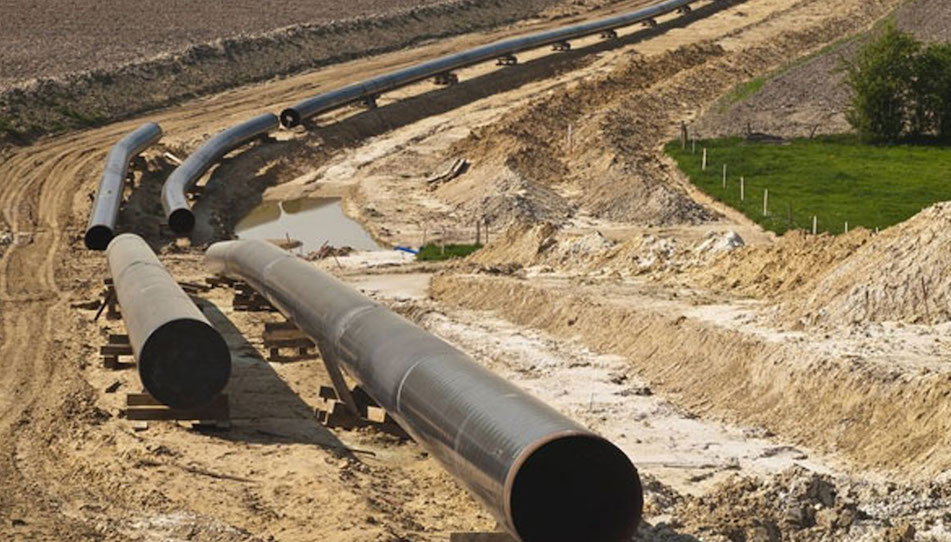New Jersey told the U.S. Supreme Court, in a March 31 filing, that seizure of state-owned land by private natural gas pipeline developer PennEast violates its sovereign immunity and the U.S. Constitution.
At issue is the construction of the firm's proposed 116-mile pipeline from Luzerne County, Pa., to New Jersey to transport gas to East Coast markets. The route including state-protected parcels, and New Jersey challenged the pipeline company’s attempt to condemn the land in federal court.
The high court agreed in February to hear the dispute, and its decision is being closely watched by the pipeline industry, states and environmental advocates.
The Federal Energy Regulatory Commission (FERC), under the federal Natural Gas Act, approved the pipeline in 2018. PennEast then filed lawsuits to condemn 42 properties such as state forests and others preserved in perpetuity for agricultural, recreational, or conservation use, with the suits then granted by a federal district court
“There was thus a serious concern that important public lands would be condemned even as the pipeline and its path were still under review,” the state filing said.
In an April 7 supporting brief, a coalition of 19 states said they have an interest to preserve fundamental principles of state sovereign immunity and federalism. “Concern for state sovereignty is particularly strong when the private suit affects a state’s authority over its own property,” they said. "States hold property for public purposes and Congress cannot cede the power to take that property to a private party."
Two of the states, Oregon and Maryland, face similar issues to New Jersey’s related to pipiline projects. FERC issued a certificate for the 229-mile Jordan Cove Pipeline last year that would cross state owned water and land. In Maryland, the Eastern Panhandle Expansion project sued to condemn property owned by the state Dept. of Natural Resources.
The Council of State Governments, National League of Cities, U.S. Conference of Mayors, International City/County Management Association and International Municipal Lawyers Association also supports New Jersey in the action.
Tthe federal appeals court in Philadelphia reversed the lower court’s decision in 2019, expressing “deep doubt” that PennEast could take New Jersey to court without its consent under principles of sovereign immunity. The appellate court ”recognized that endorsing private condemnation actions against a nonconsenting state would work a serious affront to state sovereignty,” the state told the Supreme Court.
The New Jersey Conservation Foundation, which filed a supporting brief, said March 31 that “the law is on our side, as the Natural Gas Act does not give private pipeline developers the right to drag states into court.” Jennifer Danis, the group's Columbia Environmental Law Clinic co-counsel, said “the state's decision to protect these preserved farms and conservation lands from private condemnation falls squarely" under the Constitution's11th Amendment.
But argues Tony Cox, chair of the PennEast board of managers, “Congress passed the Natural Gas Act specifically to avoid state and local vetoes of interstate projects found by federal regulators to be in the public need and benefit. The misguided Third Circuit ruling ... turned nearly 80 years of federal government interpretation and industry practice on their heads."
He said New Jersey “even agreed that the U.S. Constitution allows the federal government to condemn state property and took issue only with whether it can delegate that authority to a private party.”
Cox said 18 business, labor and consumer advocacy groups filed supporting briefs, which “demonstrate the importance of reversing the Third Circuit decision. We remain hopeful that after hearing full arguments this term, the U.S. Supreme Court will agree.”
States argue, howerver, that "the statute says nothing of the sort,” saying, that in fact the National Gas Act is silent on that issue.
While PennEast argues that the silence gives implicit intent of the federal government to delegate the condemnation power to private parties, state supporters said Congress must “state unequivocally when it intends to disrupt the Federal-State balance. The NGA includes no such clear statement.”
The acting U.S. Solicitor General, also on March 31 argued against New Jersey, saying “FERC has a strong interest in ensuring that courts do not entertain collateral attacks on FERC-issued certificates.” The government also noted its strong interest in ensuring that private entities with FERC-issued certificates have the “authority necessary to carry out federally approved projects, including through the exercise of eminent domain.”
States also took issue with the solicitor general argument that they must assert their sovereign immunity in administrative proceedings before FERC, asserting that the practical effect of that argument would be to repeal a state’s sovereign immunity using “jurisdiction-stripping rules” because FERC proceedings may not be completed until after the condemnation process is finished.
The court will hear oral arguments April 28.
Meanwhile, two New Jersey Democratic members of Congress introduced legislation last month that would require FERC to apply certain procedures before granting approvals for pipelines.
The Safer Pipelines Act, introduced by Rep. Bonnie Watson Coleman and Rep. Tom Malinowski, would amend the Natural Gas Act to require a review of major energy infrastructure projects in the region, including their need and their impacts on state and regional energy goals and the environment. It would also require five years of monitoring to ensure environmental impacts are mitigated.
The legislation “will ensure approvals of future pipelines consider existing capacity as well as closely monitor the environmental impacts of new construction,” said Coleman.






Post a comment to this article
Report Abusive Comment